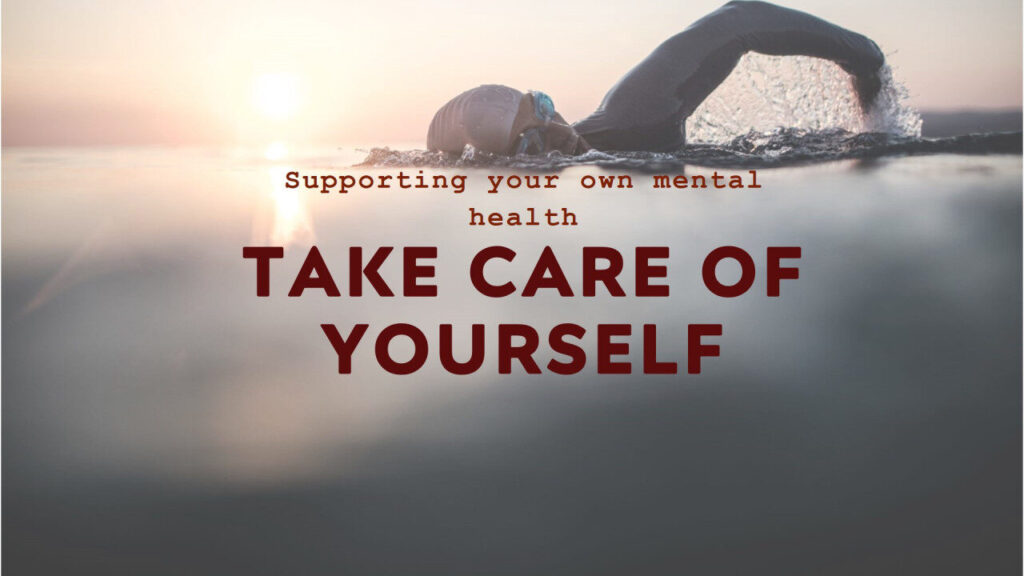Self-Care: Supporting your own Mental Health

Self-Care: Supporting your own Mental Health The Silent Burden of Mental Health Support When we think about mental health and emotional struggles, the focus is often on the individuals directly experiencing the challenges. Their pain, their stories, and their recovery take centre stage – as they should. However, there is another side to this story, one that is often shrouded in silence. It is the story of those that offer mental health support: The parents holding their child’s hand through endless therapy sessions. The friends who always answer the midnight call. The colleagues who pick up the slack when someone cannot cope, and The Mental Health First Aiders (MHFAs) who step in during moments of concern or crisis. Supporters are the unsung heroes in the mental health journey. They listen. They encourage. They are there to be talked to. Yet within this diverse group lies a unique distinction: while everyone has the capacity to provide emotional support, trained Mental Health First Aiders (MHFAs) take on a formal and vital role that requires skill, knowledge, and dedication. Whether you are a supportive friend or a certified first aider, one thing remains true, the burden you carry is often silent yet profound, and the emotional toll on yourself can creep up slowly, almost imperceptibly, until it becomes overwhelming. Ask yourself this question When was the last time you considered the well-being of someone supporting you? or your own well-being if you are the one offering support? Supporters, particularly MHFAs, often feel an unspoken expectation to remain strong, to never falter, and to always be available. This expectation, whether internal or external, can lead to a dangerous pattern of self-neglect. This post is for them; for you. It is (in my opinion only) an honest look at the challenges faced by anyone who supports others, whether through compassion, friendship, or formal MHFA training. Here’s the truth: You cannot pour from an empty cup. If you neglect your own needs, you risk burnout, compassion fatigue, and emotional exhaustion, all of which diminish your ability to help others. In this post I take a moment to shift the focus. This is not about what you can do for others; this is about what you can do for yourself. It is about giving yourself permission to prioritise your own mental health, recognising the warning signs of burnout, and embracing self-care as an essential, not optional, part of being a mental health supporter – whether you are a parent, friend, colleague, or MHFA. I explore the emotional weight of supporting others, why self-care is not selfish, and practical ways to protect your own mental health while continuing to be there for those who need you. Remember this: caring for yourself is not just an act of self-preservation, it is an act of love for those you are supporting. After all, when you are at your best, you can give your best. Why Supporting Others Can Be Emotionally Draining At first glance, the role of a mental health supporter may seem straightforward: You show up, You listen, You care. Beneath the surface lies a far more complex and emotionally taxing reality. Supporting someone through mental health challenges means opening yourself up to their pain, holding space for their emotions, and often putting their needs ahead of your own. It is an act of profound compassion, but it can also come at a significant personal cost. The Emotional Labour of Support Support (of any kind) is not a one-time event; it is an ongoing process. Whether you are a colleague offering a shoulder to lean on or an MHFA following a structured action plan to assist someone seeking help, the emotional labour of support requires sustained energy and focus. For untrained supporters, this might look like being a constant source of reassurance or encouragement. For qualified MHFAs, it can mean managing their own emotions while calmly navigating someone through a potentially life-altering moment. This labour is often invisible, especially when the main focus is rightly on the person experiencing distress and/or seeking help. However, it takes a toll on the person offering support, who may carry that emotional weight long after the conversation has ended. Over time, the cumulative effect of being the “go-to” person for someone’s mental health needs can lead to feelings of depletion and even resentment; emotions that are rarely acknowledged due to fear of seeming uncaring. The Blurred Boundaries Between Helping and Overextending For all supporters, it is easy to blur the lines between healthy support and overextending yourself. You may feel obligated to say “yes” to every request, even when it strains your own well-being; this is what makes us human. The unspoken mantra of: “I’ll rest later – they need me now” becomes a pattern that chips away at your own mental and physical reserves. For MHFAs, the boundaries are often more clearly defined through training, but the responsibility of adhering to best practices while being emotionally available can still feel overwhelming. The knowledge that your role is to bridge the gap between immediate support and professional intervention can create pressure, particularly if resources are limited or the person needing help resists further action. The Weight of Responsibility All supporters, especially those with MHFA training, may feel an immense sense of responsibility for the person they are helping. You might question whether you have done enough or worry that your actions, or inactions, could worsen the situation. This sense of responsibility, while rooted in care and compassion, can lead to guilt when outcomes do not improve or when you simply cannot be there for someone all the time. For untrained supporters, this responsibility is compounded by a lack of training or guidance. You may feel unequipped to handle certain situations, yet still carry the weight of believing it is your job to “fix” the person you care about. The truth is, whether you are an MHFA or an untrained supporter, you cannot solve someone
